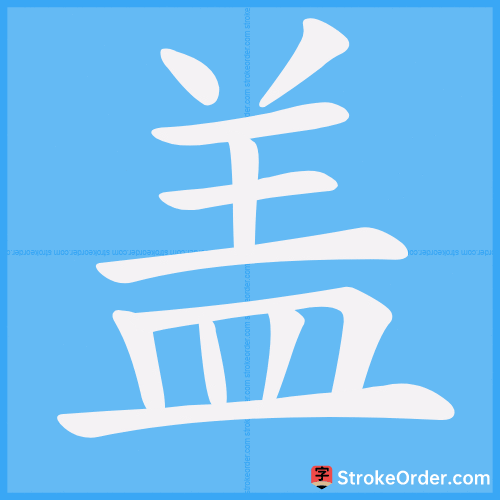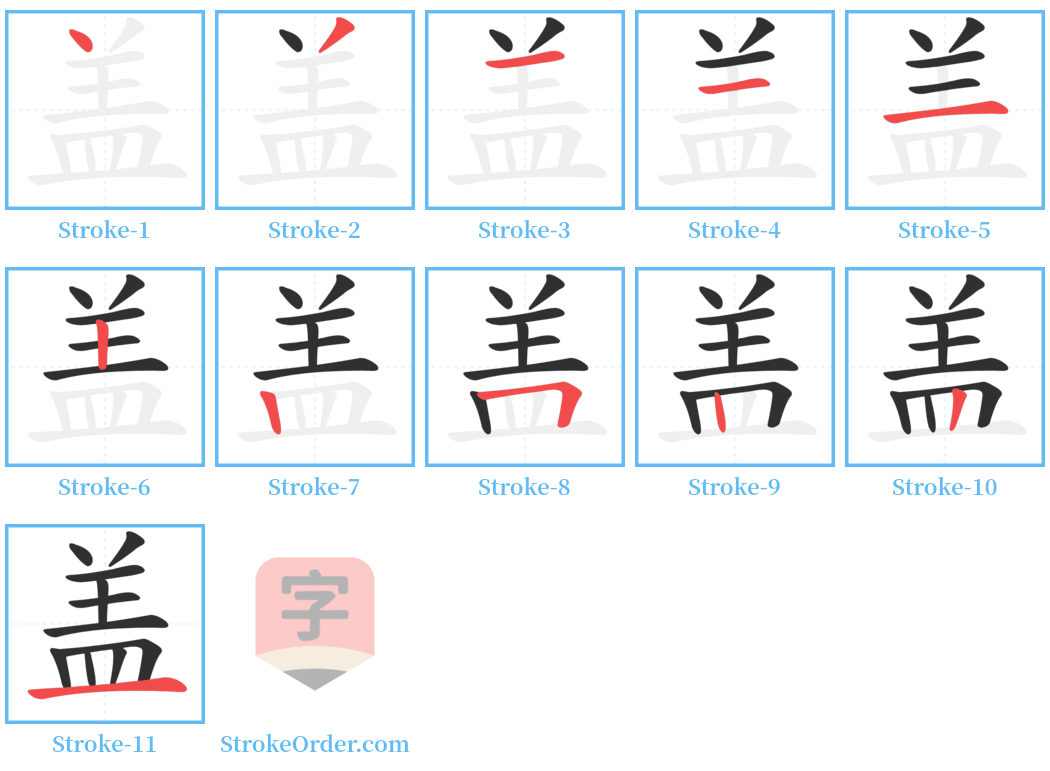盖 Stroke Order
Animated Stroke Order of 盖

Stroke Order Diagrams for 盖

Step-by-Step Handwriting Guide for 盖

Learn to Write Chinese Characters with Video Tutorials
Watch the video of writing the Chinese character "盖", learn the correct stroke order (笔顺) of the character "盖", and master the standard way of writing the character "盖".
Free Printable Handwriting Practice with Stroke Order: 盖
Printable Writing Practice Worksheet of "盖" in Portrait Orientation (Tian Zi Ge)

Printable Writing Practice Worksheet of "盖" in Landscape Orientation (Tian Zi Ge)

Information of 盖
Pinyin
gài、 gě、 hé
Radical
皿
Strokes
11 strokes
Usage
★★★★★
Definition
lid / top / cover / canopy / to build, (surname)
盖
gài
1. An object that has a covering function: such as a cover, lid, or mat (straw mat).
2. Umbrella: rain cover.
3. To cover or conceal from above: to mask, shade, or hide.
4. To overwhelm or surpass.
5. Dialect: extremely good or excellent.
6. To stamp or mark with an imprint.
7. To construct (houses).
8. Classical particle: (1) a filler word, as in “~闻” (I have heard); (2) indicating generality, as in “~近之矣” (this is approximately so); (3) a conjunction that indicates cause, as in “有所不知,~未学也” (there are things I do not know; it is because I have not learned).
1. An object that has a covering function: mat, pot cover, bottle cover, knee cover, head cover.
2. Umbrella: rain umbrella.
3. To cover or conceal from above: to cover the meal.
4. To overwhelm or surpass: unparalleled in the world.
5. Dialect: This book is truly great!
6. To stamp or mark with an imprint: stamp, seal.
7. To construct: to build a house, to reconstruct.
8. Classical particle: (1) a filler word, as in “~闻” (I have heard); (2) indicating generality, as in “~近之矣” (this is approximately so); (3) a conjunction that indicates cause, as in “有所不知,~未学也” (there are things I do not know; it is because I have not learned).
盖
gài
Noun:
The original meaning: a covering made from reeds or straw.
Character formation: phonetic-ideographic; composed of the grass radical and the phonetic component 盍 (hé).
1. A mat, made of straw, that can cover the body or roof (straw mat).
2. Umbrella.
3. Canopy on a carriage.
4. Lid or cover of a container.
5. A rake, a type of agricultural tool.
6. A leaf of a door.
盖
gài
Verb:
1. To hide, cover, or conceal; extended meaning to summarize.
2. To surpass or exceed.
3. To build.
4. To harm or injure.
5. To close.
Because, due to.
Exclamatory particle: an indication used to suggest something.
盖
gài
Adverb:
1. Indicates conjecture, equivalent to "approximately" or "probably."
2. However, then.
3. Also used as "盍" (hé).
4. Why.
5. Why not.
6. See gě.
1. An ancient place name, located in the northwest of Yichuan County, Shandong Province.
2. A surname.
盖
gě
Noun:
1. An ancient place name: Ge town, established during the Warring States period, later created as a county during the Han dynasty, later abolished in the Northern Qi dynasty. The ruins are located in the northwest of present-day Yichuan County, Shandong Province.
2. Also see gài.
同“ 盍 ” (hé), classical particle, meaning "why not."
Adverb: why or for what reason, same as “盍.”
Example: "In this world, if one has power and wealth, can it be ignored?" (from "The Strategies of the Warring States").
lit. splitting the head and covering the face (idiom); fig. pelting (with rain etc) / showering down
lit. hiding the sky and covering the earth (idiom); fig. earth-shattering / omnipresent / of universal importance
to seal (with official stamp) / to stamp / fig. to ratify / to put lid on (cooking pot) / to cap / to build an extension or additional storey
Input Method for 盖
Pinyin
gai4
Wubi
uglf
Cangjie
tgbt
Zhengma
uclk
Four Corner
80102
Unicode
U+76d6
Same Pronunciation Characters